Pigeon breeding is a fascinating subject for nature lovers and bird enthusiasts. The life cycle of these common birds encapsulates a series of natural processes that make a compelling story. Pigeon eggs hatching is one such phenomenon, an important event that signals the continuation of the pigeon species.
Pigeon eggs typically hatch after 18 days of incubation. This period can vary slightly, influenced by factors such as the environment and health of the parent pigeons. During incubation, both parent pigeons share the responsibility, taking turns to keep the eggs warm until they hatch.
Pigeons, with their widespread distribution and adaptation to various habitats, exhibit remarkable breeding behaviors. Their eggs’ hatching process provides unique insights into the survival strategies of these feathered creatures, revealing nature’s wonders in a city’s heart or a serene countryside.
The Pigeon’s Mating Cycle
Choosing a Mate and Courtship
In pigeons, the process of mate selection involves a ritualistic display known as courtship. The male pigeon displays distinctive behaviors such as bowing and cooing to attract a potential mate. Once the female accepts the advances, the pair forms a bond that often lasts a lifetime.
Nest Building and Egg Laying
Post courtship, the pigeon pair starts building their nest. They use twigs, leaves, and other materials, with the male typically gathering the materials and the female constructing the nest. After the nest is ready, the female lays one or two eggs, which is the usual clutch size for pigeons.
The Pigeon Incubation Period
Duration and Parental Roles
The incubation period for pigeon eggs lasts about 18 days. However, it’s crucial to note that this period begins after the laying of the second egg, ensuring that both eggs hatch around the same time. Both parents share the incubation duty, with the female typically incubating during the night and the male during the day.
Signs of a Soon-to-Hatch Egg
Around the 17th day, signs of a soon-to-hatch egg become evident. These signs include the eggshell becoming thinner and the movements of the chick inside the egg becoming more visible.

The Hatching Process
Hatching Stage
The hatching stage is a critical period for the baby pigeon, known as a squab. The squab uses a small, hard bump on its beak, known as an egg tooth, to break open the eggshell, a process called “pipping.” It may take a full day or more for the squab to completely break free from the egg.
Challenges During the Hatching Process
Despite the seemingly straightforward process, hatching can pose certain challenges. For instance, if the eggshell is unusually hard, the squab might struggle to break free. Additionally, improper temperature or humidity levels during incubation can also affect the hatching success.
Care for Newly Hatched Pigeons
Essential Pigeon Chick Care Tips
After the squabs hatch, they depend on their parents for warmth and food. The parents feed them “pigeon milk” – a nutrient-rich substance produced in their crops. However, if the squabs are orphaned or abandoned, human intervention becomes necessary. Providing appropriate warmth, hydration, and a suitable diet are essential parts of their care.
Diet Requirements for Growing Pigeons
As the squabs grow, their dietary requirements change. They gradually shift from pigeon milk to partially digested seeds and grains. Eventually, they start consuming whole seeds and grains, similar to their adult counterparts.
Pigeon Growth Stages
From Hatchling to Fledgling: A Timeline
The growth stages of pigeons are distinctive. From being completely dependent hatchlings, they transform into fledglings capable of independent flight within four to six weeks. This rapid growth is astonishing, reflecting the pigeon’s adaptation to its environment.
The Journey to Independence
The journey from hatchling to independence for a pigeon chick is a fascinating process. With the development of their feathers and increasing strength, they begin to explore their surroundings and start their flight attempts. By six weeks, most pigeon chicks are usually ready to leave the nest.
Common Questions About Pigeon Eggs
Why Pigeon Eggs May Not Hatch
There are several reasons why pigeon eggs might not hatch. Factors such as improper incubation, parental health, or genetic issues can influence hatching success. Even environmental conditions like extreme temperatures or high humidity levels can adversely affect the eggs.
Safeguarding the Eggs and Chicks
Protecting pigeon eggs and chicks from predators and harsh weather conditions is essential for their survival. The parent pigeons instinctively play a role in safeguarding their progeny. However, in situations where human intervention is necessary, professional advice from a vet or a wildlife expert should be sought.
Conclusion
The hatching of pigeon eggs signifies the intriguing life cycle of these common, yet extraordinary birds. It’s a testament to nature’s resilience, where each hatchling’s emergence stands as a triumph against the odds, promising the species’ continuity.
Understanding the pigeon’s breeding behavior, from mating to the hatching of eggs, illuminates their survival strategies. These insights provide a closer look at their world, often hidden in plain sight amidst urban or rural settings.
Observing these natural processes fosters a deeper appreciation for pigeons. Whether in a bustling city or a tranquil countryside, pigeons are symbols of adaptation and survival, their life cycles intricately intertwined with the environment they inhabit.